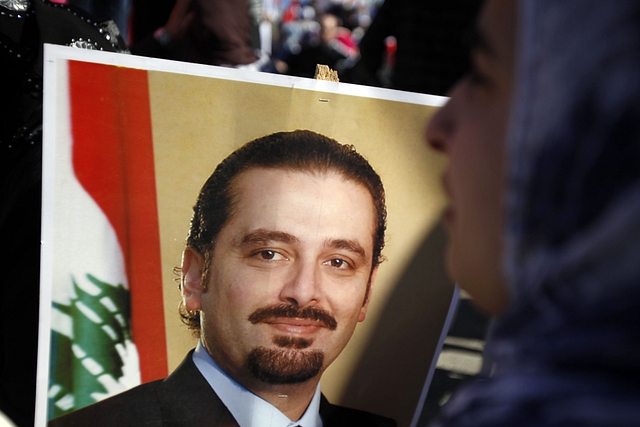
The Lebanese Coup: Made In Saudi Arabia
Saudi Arabia’s choice of a leader in Lebanon to take on the Hizbollah is Saad Hariri’s brother, Bahaa, but the Lebanese people wish to have their Prime Minister back.
Has Crown Prince Mohammad bin Salman overplayed his cards?
When Saad bin Hariri, the Sunni Prime Minister of Lebanon landed at Riyadh airport on 4 November 2017 to begin an official visit to Saudi Arabia, it wasn’t business as usual. For the first time in years, a head of government of a country was virtually kidnapped, forced to tender his resignation and detained in a foreign land by a foreign government.
The nearest parallel one can imagine and that too hypothetically would be if a Prime Minister of Sri Lanka were to visit India in the heyday of the Liberation Tigers of Tamil Eelam (LTTE), get detained, be forced to tender resignation with attempts being made at setting up another government favourable to Indian viewpoint on handling the LTTE menace. The last bit is also being played out with Saudi Arabia trying to get Saad Hariri’s elder brother Bahaa Hariri to be the Prime Minister with reports of the latter’s family travelling to Riyadh to urge him to take on the role.
These surprising and to an extent amusing developments in the Middle East have a complex backdrop which needs to be simplified for a broad understanding of what exactly is happening in the region. A couple of way points and their effects need to be pegged in the mind to get a measure of this.
First, the ISIS has been defeated militarily and evicted from its territories; it continues to exist in virtual and networked state.
Second is the emergence of domination in the Syrian Civil War of the Russia-Iran-Syria combine. Hizbollah, the Iran supported Shia group in Lebanon has assisted Syria’s Allawaite (quasi Shia) leader Bashar Assad in the civil war. The combination of the above two factors has manifested in an impending domination of the Levant by Iran, from north western Iran through north Iraq and Syria right up to Lebanon. In the latter the Hizbollah (again Shia) remains the dominant force.
Third, and very importantly, Islam’s sectarian struggle, which has replaced the Arab Israeli conflict as the main conflict of the region has reached a point of criticality. Saudi Arabia as the self-perceived leader of the Sunni world is increasingly feeling hemmed in by its failing engagement in Yemen where Iran’s Shia proxies, the Houthis are unlikely to be militarily subjugated despite Saudi efforts to raise a 39-nation combined Sunni counter terror force under the leadership of former Pakistani Army Chief, General Raheel Sharif. Going beyond the air campaign and converting this into a ground war is not within capability of Saudi Arabia and its allies.
It is advantage Iran in the north; that is the Levant. It is also advantage Iran in the south; that is Yemen. Saudi Arabia is aware of the large Shia segment within its shores in the east, in the important energy zone of Dammam; that could be instigated to rise and create problems internally. Viewing this situation from Riyadh would definitely send a shiver down the spine and a rush to anyone who can play a role in countering the advance of Iran, especially since it seems to be having Russian support.
To add to the worries, the US backed four-nation attempt to isolate Qatar doesn’t seem to be succeeding on lines which were anticipated. The nation with a common agenda against Iran is Israel and has its reasons to feel concerned with the expanding success of the Shia juggernaut. It fought a war with a much weaker Hizbollah 11 years ago and perceives its security is jeopardised unless Hizbollah is somehow controlled.
The sharing of power in Lebanon is done on the basis of a 1932 census, which has never been updated. The President is a Maronite Christian, the Prime Minister, a Sunni and the Speaker of the Parliament, a Shia. Saad Hariri’s father, late prime minister Rafic Hariri was assassinated allegedly by the Hizbollah in 2005. Saad Hariri himself has been under Saudi and Israeli pressure to rein in the Hizbollah whose linkages with Iran have given it out of proportion military capability, particularly in the field of missilery and rocketry. That is hugely worrisome for Israel whose ‘iron dome’ capability can defend it against a limited attack by missiles and rockets.
The Saudi-Israeli strategic cooperation has arisen out of the need to contest the march of Shia (read Iranian) power in the Middle East. The events in Riyadh are all linked to the scenario explained above. Crown Prince Mohammad bin Salman’s (MBS) actions are apparently to take the Iranian threat much more seriously and alter the course which Saudi Arabia is following. The palace coup which appears thus far to be a success is designed to weed out royal corruption, dilute the extreme Sunni Wahabi religious practices and limit the power of the clergy. All this while preparing Saudi Arabia for an era without energy and petro dollars (2030 and beyond). A more focused strategic shift to limit Iran’s power is the larger intent.
MBS may call off the disastrous war in Yemen but must do something more in the north. That is where he has Israeli support. It could start with Lebanon and more robust efforts to control Hizbollah. Saad Hariri was considered unequal for that task and the bets are on Bahaa Hariri, the elder brother.
Thus this entire drama, the end of which we have not yet seen. It has surprised many to see the response within Lebanon to the alleged detention of their Prime Minister. Hizbollah or no Hizbollah, the Lebanese people wish to have Saad Hariri back as their Prime Minister. Has MBS overplayed his cards with this one, and attempted things, which would be classified as being too smart by half?